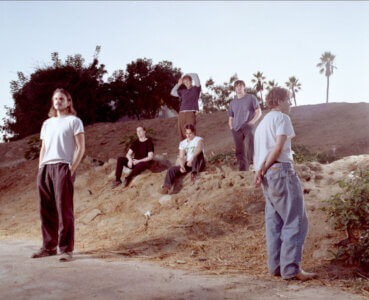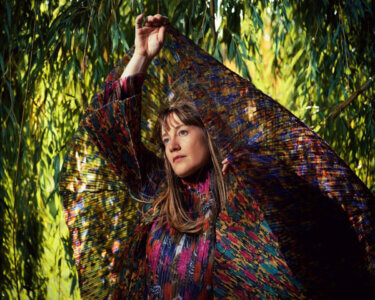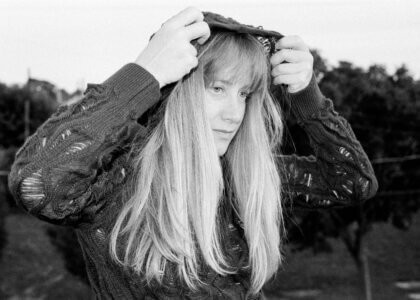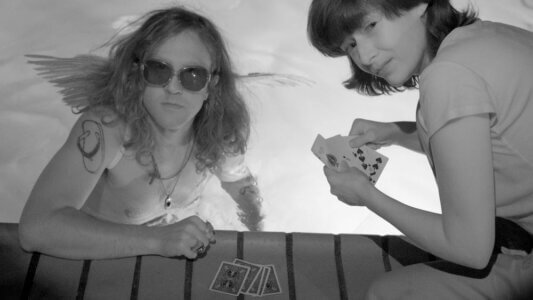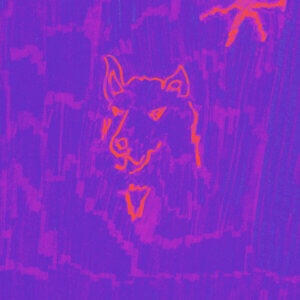The Weather Station returns to her childhood self

Growing up in a remote part of Ottawa, Tamara Lindeman, aka the Weather Station, has always felt a close bond with nature. Even back then, she knew Earth’s climate was in trouble. Throughout her adolescence, however, she avoided her anxiety about climate change and her sense of complicity. It wasn’t until a couple of years ago that she had an awakening: she began actively reading about today’s climate crisis, and the more she learned, the more she felt connected to the world around her. After all, no one is exempt from the disastrous long-term effects of climate change.
Lindeman channeled her newfound awareness into her work. She organized talk sessions, and on her fifth album, Ignorance, she asks the crucial question: how do we deal with crises, from the deeply personal to the global?
Ignorance is a surprising evolution for a folk-rock artist. The album features a cast of Toronto musicians culled from pop and jazz backgrounds. The result is sweeping and agile. Its 10 tracks bound with equal parts grace and unwieldy energy. They kick their hind legs but always land softly. Their beautiful arrangements contrast Lindeman’s flickering and flaring anxiety and anger. Her aesthetic change feels organic, a wholly rewarding creative challenge.
On Ignorance, Lindeman wonders how she can best give back to the planet she feels guilty about eroding. How can she do so while living more intentionally, as her most authentic self? How can she combat wilful ignorance and the intentional spread of disinformation? How do people arrive at the ideas and principles by which they live and die? She asks these questions while discovering a greater sense of connection with her environments, be they the planet, live audiences, or musicians in a studio, or a movement that has upheaved society, like Me Too.
Lindeman unpacked her recent revelations with Northern Transmissions over the phone.
Northern Transmissions: Reading about your days as a child actor up until now, you seem to have experienced a lot of push and pull between losing sense of yourself and finding your own voice, and between wanting to fall into the background and wanting to take charge. Have those tensions been hard to balance?
Tamara Lindeman: For sure. As an actor, I learned to sublimate myself in service of other people’s visions, and that was something I learned as normal, that I didn’t question. When I look back over my journey of becoming a musician, what I see is someone who needed to carve out a small space to be the opposite of that, to be very individual and uncompromising. So much of my working life is about me and my selfhood, and that’s odd, but it’s come a long distance. It’s difficult to figure out how to be a leader or selfish. In the music universe, it’s a role I need to play, in terms of the more uncompromising I am, the better the art is. But I’m not really like that in life. But music is a place where I’ve learned to be like that, though it’s still hard to do.
NT: The kind of anxiety you felt about acting translated to performing music in front of people, because audiences expect you to reflect their emotions back on them. Now that you’re playing livestreams, how do your feelings about having to sublimate yourself to fulfill audiences’ expectations differ?
TL: [Playing livestreams] is like making a record, only with a camera present. I’ve enjoyed it, because I’ve felt like I’ve had all these artistic chances to reinterpret [the songs] in the moment. It’s been exciting as essentially a recording project. You’re thinking about the existence of other people; their presence just isn’t immediate.
NT: How does engaging in climate activism make you feel in terms of your place in the world? On one hand, it’s a completely communal concern – it affects everybody – but is it also really self-affirming because it shows you how much you as an individual have been able to do with your organizing work, or at least the talk sessions before your shows?
TL: I don’t really feel like I’ve done anything, which is the way I think it’s always going to feel. I think even full time activists feel like, “What did we accomplish?” I think what I feel more than anything is it feels really good to live more of my values in public. I guess I just realized that I have a really small but not insignificant fragment of cultural power, so I’ve been thinking a lot about shifting culture in a very small way, and that includes music and videos and conversations. But I think of that as more to do with empathy and trying to talk to people’s hearts. I feel a greater alignment with who I am and what I care about.
Another aspect is I’m almost returning to my childhood self in a way. When I was a kid, I really unapologetically loved the natural world and wanted to protect it, and I think that’s a side that when you go through the meat grinder of teenagehood, you have to set that aside. Sincerity is not cool. Being super sincere and serious is letting my child self out in public.
NT: All the more credit to Greta Thunberg.
TL: Yeah!
NT: It sounds like the key difference now, besides reading the research and having this recent awakening, is that you also recognize that you’re better equipped emotionally, and also in terms the platform you have, to do what you can to help counteract any part that you, just as a human being, have had in climate change.
TL: When people are really honest and emotional in public, when they say something, it gives other people who feel that permission to feel it and permission to say it. And we’ve all seen the good and the bad of the power of our voices.
NT: Working with a lot of fearlessly adventurous jazz musicians seems to have inspired you to carry the same attitude. When you were working with them, did you feel you were relinquishing a bit of control and going a bit more with the flow?
TL: On one hand, I was a little more loose on this record, but on the other hand, I was way more controlled than I ever had been. There were whole arrangements I micromanaged ahead of time. There were some songs where I was like, “Okay, go crazy.” It’s like so many things in life: when you take care of controlling or planning the things you need to, you can then be more open to chance. When you’ve got your homework done, you can enjoy yourself better; you can enjoy your day.
NT: You were open enough that you were surprised by a lot of the songs. You were sometimes surprised when you listened back that that was your music.
TL: Yeah, I definitely felt that, but mostly because I did make this record like two years ago. It’s been really nice, actually, to have this huge chunk of time go by and to have a bit more space from it before having to return to it.
But there is an element of songs that comes from somewhere else, and sometimes you really do feel like, “What did I just do?” There are times where you feel like you’ve just taken your dirty laundry and shoved it in people’s faces. It’s like having your diary read aloud. And there are times where that feels very humiliating, and you feel trapped by yourself. But then there are moments where the timing is right, or the mood is right, and you listen to it, and you hear it as though it wasn’t you. It’s a nice mind switch that gets flipped, and you hear it as a record that you bought and enjoyed. But I would say I err on the side of the feeling of the dirty laundry more than the mystical moment of positive disassociation.
NT: Were you also empowered by now being on a label that actually has other women on its roster and meeting or even just hearing so many more amazing women in music?
TL: I think it came more from Me Too. It allowed me to see myself in a way that I hadn’t before, where I suddenly understood a bunch of experiences from the past I had blamed myself for. I realized I wasn’t at fault. All these experiences where you try to state an opinion and everyone tells you you’re wrong – there really was a shift after Me Too that I actively noticed in my life: men just started listening to women, myself included. I just thought that I wasn’t listened to because I didn’t say the right things. I think a lot of women have had the experience of blaming themselves for things that are societal and gender-based.
So it wasn’t about meeting women in music – I always knew great women in music. For me, it was really a matter of understanding that my opinions and perceptions are every bit as valid as the opinions and perceptions of the men I was working with. I can be just as uncompromising and pushy as they would be, because it’s my project. In the past, I did go through a dip where I didn’t know how to assert myself, and I didn’t know how to trust myself. I still made some good music, and it’s not that the people I worked with weren’t wonderful and thoughtful and empathetic; it’s just that I would turn myself around because I would doubt everything I thought. And that is connected to Me Too because the experience of having a societal level validation occurring did translate to greater inner validation for me. It’s still a struggle, but it allowed me to be aware of what I actually feel.
NT: The album is about trying to understand your place in the world and trying to live in it more intentionally. Now with Me Too opening up your perspectives about yourself and the world around you and being engaged in climate activism, is this all helping make you feel less alienated? Do you feel more in control of your life and art? Do you worry less about yourself the more you’re connecting and engaging with the world?
TL: I feel a daily struggle of navigating expectations and requirements of musicians and the ways in which music is in bed with some pretty unsavoury companies that morally I don’t want to support. I’m still making compromises all the time. But I think that’s common. A lot of us are engaged in our working lives with trying to weigh the moral injury of how we feel, because I think with most jobs nowadays, there’s some cost. But I definitely feel a far greater sense of control and respect in my working life. I fought for it, so I feel grateful for it.
NT: As someone who prefers to be in the background but has become a better leader through activism, is there any particularly vital lesson you’ve learned about balancing taking charge or amplifying other people’s voices without taking up too much space yourself?
TL: Sometimes I do feel like I’m taking up too much space, and sometimes I feel like I’m not taking up enough space. I guess I just think that what I believe I’m here to do as a person and as a songwriter is increasingly the same: as a songwriter, when you tell a personal story, people resonate with it empathically, and they bring their own story to the song. There’s a power in the first person, there’s a power in stories, and there’s a power in sharing. And it’s the kind of power people find non-threatening and helpful.
I’m still trying to figure out what I can do for climate and how I can be the most useful, but something I’ve held to is that a lot of people want you to do [activism] their way [and tell you] what activism is and what you’re supposed to do. You’re supposed to join an organization and use slogans and abide by the talking points, and that didn’t make much sense to me. As I’ve been wandering lost through the world, I do feel like my skill as a person is to present the narrative or emotions in a way that allows people to feel their own. I sometimes feel like I’m a cipher, and maybe I can carry that role into other aspects of life.
Order Ignorance by The Weather Station HERE
Latest Reviews
Tracks
Advertisement
Looking for something new to listen to?
Sign up to our all-new newsletter for top-notch reviews, news, videos and playlists.





